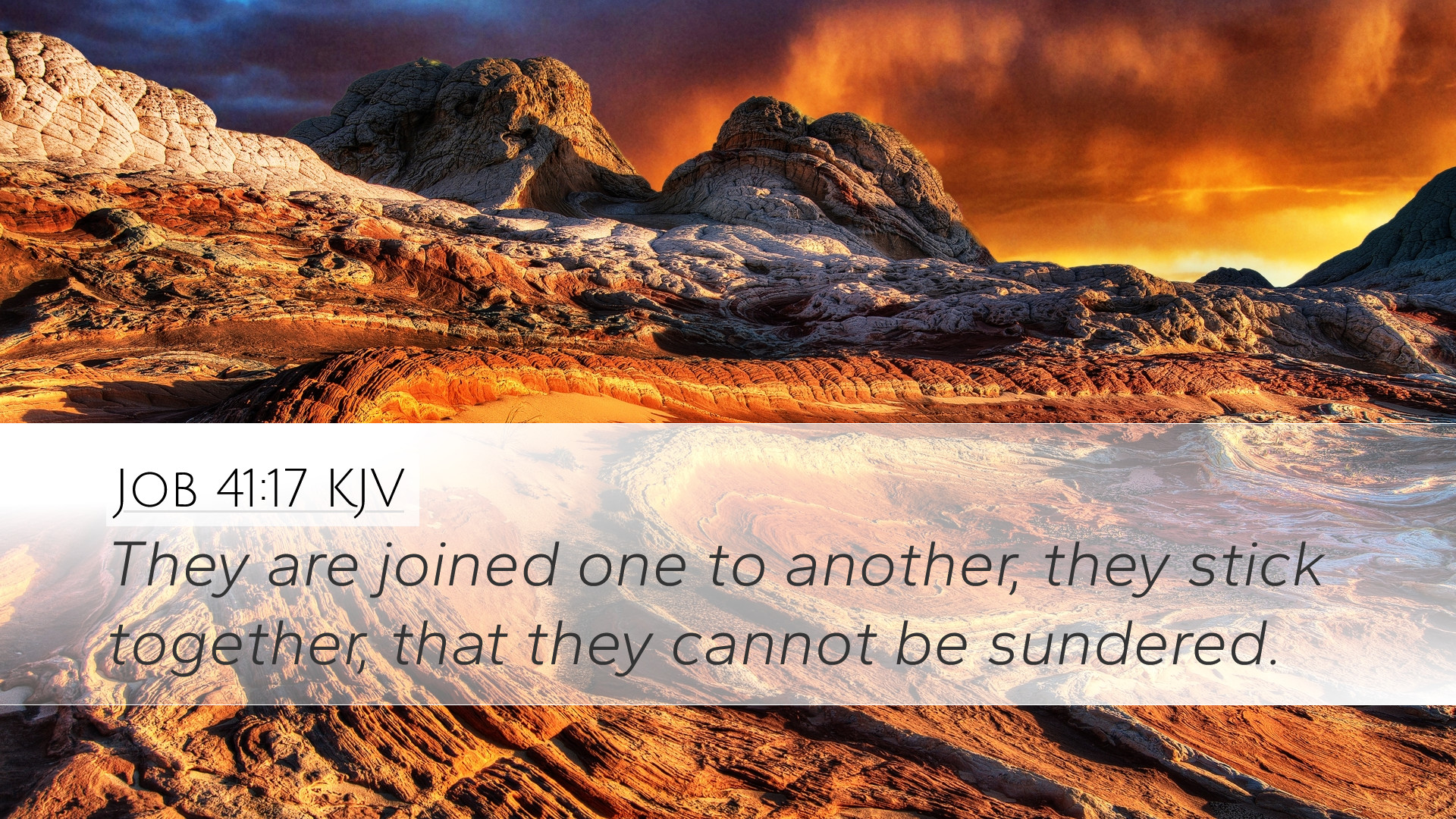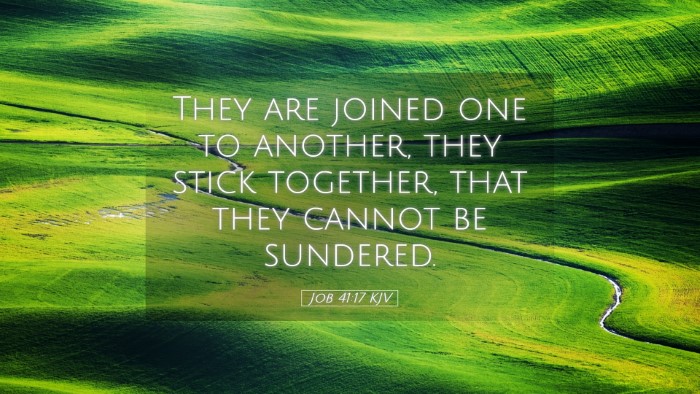Commentary on Job 41:17
Job 41:17 states, “They are joined one to another; they stick together, that they cannot be sundered.” This verse, nestled within the magnificent description of the Leviathan, emphasizes the creature's formidable nature. Insights from various public domain commentaries provide profound understanding and applications of this scripture relevant to pastors, students, theologians, and Bible scholars.
Contextual Overview
In the book of Job, God speaks directly to Job out of the whirlwind, showcasing the majesty of His creation. The mention of the Leviathan serves to illustrate the limitations of human beings in the face of divine creation. This beast symbolizes chaos and untameable forces, challenging Job’s understanding of God's governance and power.
Insights from Commentaries
Matthew Henry's Commentary
Matthew Henry highlights the Leviathan as a representation of God's omnipotence. In Job 41:17, he notes the strength of the creature's scales, which are “joined one to another.” Henry points out that this imagery signifies a cohesion that is unbreakable, reflecting how God's creation is designed with intentional permanence and strength. The inability to sunder the scales presents a picture of divine protection and the unyielding nature of God's handiwork.
Furthermore, Henry draws a parallel to the unity and harmony in creation, suggesting that just as the Leviathan’s scales cannot be separated, God’s purposes for creation are interconnected and resilient. This serves to remind believers of the power and wisdom of God in maintaining the order of the universe.
Albert Barnes' Notes on the Bible
Albert Barnes elaborates on the verses surrounding the depiction of the Leviathan, particularly emphasizing the creature’s invulnerability. In his commentary, he states that the cohesion of the Leviathan’s scales signifies not only its physical strength but also serves as a metaphor for the formidable nature of evil and chaos that humanity cannot conquer alone.
Barnes surmises that the phrase “they stick together” implies that evil forces, like the scales of the Leviathan, are often intertwined and difficult to break apart. This insight resonates profoundly with the human experience of grappling with sin and chaos in the world. Believers can reflect on their reliance on God’s power to confront and navigate through these forces.
Adam Clarke's Commentary
Adam Clarke offers a detailed examination of the Leviathan, noting its symbolic representation of God’s unshakeable sovereignty. According to Clarke, the divine description of the creature serves as a rhetorical strategy to instill a sense of awe regarding God’s creations. Job 41:17, with its depiction of scales that “cannot be sundered,” illustrates the invincibility of God’s will.
Clarke also suggests that the unity of the Leviathan’s scales can be likened to the unity found within the body of believers, where each member is vital and intricately connected by God's design. This creates a powerful experience of community that mirrors the unbreakable bond of the Leviathan’s construction. Thus, Clarke challenges readers to recognize the importance of their roles within the larger body of Christ.
Theological Reflections
The thematic elements surrounding Job 41:17 provide fertile ground for theological reflection. This verse invites an exploration of God's sovereignty, the nature of evil, and the believer's response to divine authority. The strong imagery associated with the Leviathan forces congregants and scholars alike to confront the reality of a world filled with chaos, yet governed by an all-powerful God.
- God’s Sovereignty: Each commentary remark underscores God's control over creation, including forces that seem chaotic or untamable. This providential care offers comfort amid uncertainty.
- Resistance to Chaos: The description of the Leviathan can serve as an allegory for the trials faced in life, emphasizing the need for reliance on God's strength to withstand these challenges.
- Unity in the Body: Clarke's insight encourages believers to recognize the strength found in community, paralleling the unwavering connection of the Leviathan’s scales.
Applications for Believers
The complexities of Job 41:17 encourage practical applications that extend beyond mere theological discourse. These lessons can shape preaching, teaching, and personal devotion.
- Faith in Trials: Job’s experience can be a powerful testament for believers to remain steadfast in faith when facing chaotic situations. As the Leviathan is beyond human control, so are many of life’s tribulations. Believers are reminded to trust in God's power over their circumstances.
- Interdependence in Community: The imagery of the Leviathan can serve as a metaphor for the interwoven lives of the church body, emphasizing the need for mutual support and reliance on one another through fellowship.
- Recognition of Divine Power: The awe-inspiring description of the Leviathan helps believers approach God with reverence and an acknowledgment of His ultimate authority and might.
Conclusion
Job 41:17 not only illustrates the formidable strength of the Leviathan but also serves as a reminder of God's sovereign control over the universe. The insights from Matthew Henry, Albert Barnes, and Adam Clarke present a rich tapestry of understanding that encourages a deeper reflection on the themes of divinity, chaos, unity, and strength within the Christian faith. As such, this verse invites pastors, theologians, and students alike to marvel at the intricacies of God’s creation and to find comfort in His unwavering presence amid life's uncertainties.


